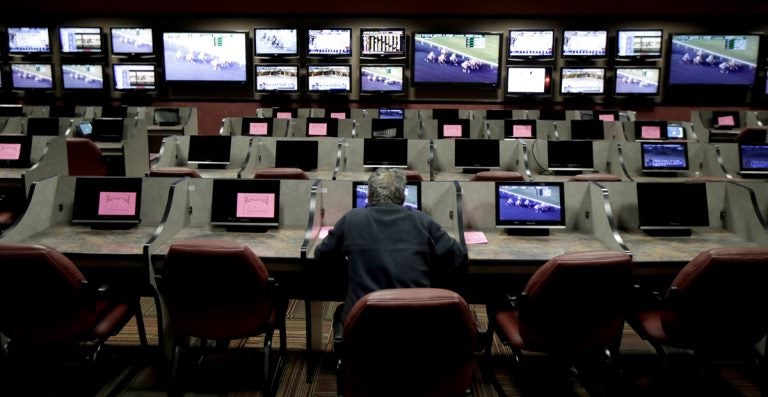New Jersey’s revenue report shows wager on sports betting paid off
Legalized sports betting is helping to boost gambling revenues in New Jersey.

The Monmouth Park racetrack in Oceanport, N.J. (Julio Cortez/AP Photo)
Legalized sports betting is helping to boost gambling revenues in New Jersey.
Sports wagering began on June 14 with just two venues but has since expanded to seven sites, including Resorts Casino in Atlantic City, which will begin taking sports bets on Wednesday.
According to the state Department of Gaming Enforcement’s monthly gaming revenue report released Tuesday, total gambling revenues are up 13 percent compared to this time last year.
“In terms of gaming revenue, that’s a big jump. It’s exciting and really good for the industry and the area,” said Rummy Pandit, executive director of Lloyd D. Levenson Institute of Gaming, Hospitality, and Tourism at Stockton University.
July was the first full month since sports betting was allowed in the Garden State and two new casinos opened in Atlantic City — the Hard Rock Hotel & Casino and Oceans Resort Casino.
Pandit says it’s too early to tell how big sports betting will be to New Jersey since the latest numbers only include a few casinos and racetracks, but the state could have as many as 14 sports gambling sites by the end of the year.
“You haven’t even had a full month of all the properties… so it’s sort of hard to estimate what the impact is going to be unless you’re at 100 percent,” he said.
All interested gaming establishments have sports betting in place or applications for it, since a U.S. Supreme Court opinion overturned a federal ban on sports betting.
The total gross revenue for July was $302.1 million, including $3.8 million for sports wagering.
Pandit acknowledges that sports betting is a factor in the revenue increase, but the bottom dollar shouldn’t be the only measurement of success.
“Sports betting numbers is not the number we should be focusing on today,” he said. “Where we need to focus on is that this is a brand-new market segment that’s coming in, and that market segment is going to grow exponentially.”
The gaming industry expert says what may be more important than its revenue amount is sports betting’s ripple effect.
“What it’s actually doing is … generating revenues for rooms, it’s generating revenues for food and beverage, it’s generating revenues for entertainment. Those are the kinds of auxiliary revenues that we also need to keep in mind,” he said.
Atlantic City is celebrating 40 years of casino gambling, as it shifts its focus away from just being a gambling town.
“40 years ago, you had the monopoly. Today, that’s not the case,” Pandit said. “Now, you have neighboring states that have gaming. You have to distinguish yourselves by being a destination resort and provide all the components that different market segments will appreciate.”
He says sports betting by itself won’t do anything in the big picture for revitalizing Atlantic City.
The gambling destination is expanding its offerings to provide a more rounded experience, Pandit notes, like other gambling-centric locations have. For example, he said 65 percent of Las Vegas’ revenues come from non-gaming activities.
Atlantic City is making progress towards diversifying its economic mix, with gambling making up about 70 percent of its revenue and non-gambling business making up 30 percent of its revenue, up from 18 percent in 2000.
WHYY is your source for fact-based, in-depth journalism and information. As a nonprofit organization, we rely on financial support from readers like you. Please give today.




